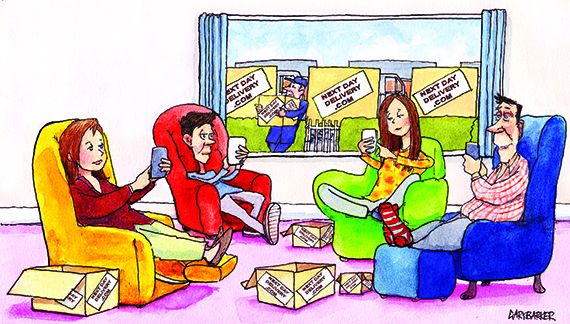How we shopped this Christmas offered further proof that times are changing in retail. Competition is set to intensify in 2015 and beyond – and drag the property market into a new era.
The internet is reshaping our high street, with online shopping forecast to account for £13bn of the UK’s £90bn Christmas spend in 2014, according to analyst Verdict.
Against this backdrop, prime retail property will remain prime, and perhaps strengthen, but secondary and tertiary will need to change drastically to survive.
Prime is not about size. It is about quality, vibrant locations where people want to spend time. Modern high streets and centres offering variety – shops, coffee, restaurants, cinemas, hotels – will survive and grow.
Poor, tired shopping centres will decline, and will need major investment. Residential will fill the gap on some high streets and over time the cycle will begin again as people drive change by demanding improvements. The days when landlords could make a lot of money by simply regearing a few leases are gone.
Customers have become more savvy: they want what they want, when they want, how they want. This is epitomised by the growth in purchases made on mobile phones. Stores are becoming showrooms: customers no longer have to buy in shops, they can browse and make purchases by phone or in the comfort of their own homes.
Shops will still be needed, but they will need to be modern, bright, exciting and in locations that people want to go to. Retailers will assess the performance of stores not just through what is taken at the till but using internet sales from the area around the store too. The multi-channel world has truly arrived.
So landlords will need to evolve their approach to rents. Should they ask for a share from web sales? Or a top up, based on regional performance?
Click and collect allows retailers to use their property assets in a different way. Verdict forecast that this market would account for £3.7bn of UK retail spending in 2014, with £1.6bn spent in Q4 alone.
But will this survive? I think it is more likely that customers will simply evolve this service into receiving goods where they want, when they want. Stores will become only one way of collecting a purchase. As we are already beginning to see, train stations, supermarkets and petrol stations will have collection points. This will soon extend to offices and maybe even schools.
All retailers will look to grow their online businesses while using their store portfolios to maintain presence on the high street and build brand recognition. Some chains will need fewer stores but the stores that remain will become more important. They will need to be in the right place, at the right size and on the right terms.
Property flexibility will become increasingly important and costs will be squeezed. Landlords will need to know more about their tenants’ businesses and work more closely with them to ensure they maximise their returns.
As retailers adapt to the new landscape, the property market will need to follow suit.
Clem Constantine is a retail property expert, Clems Consulting












